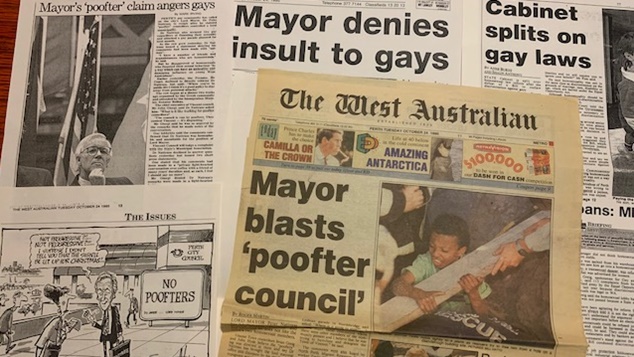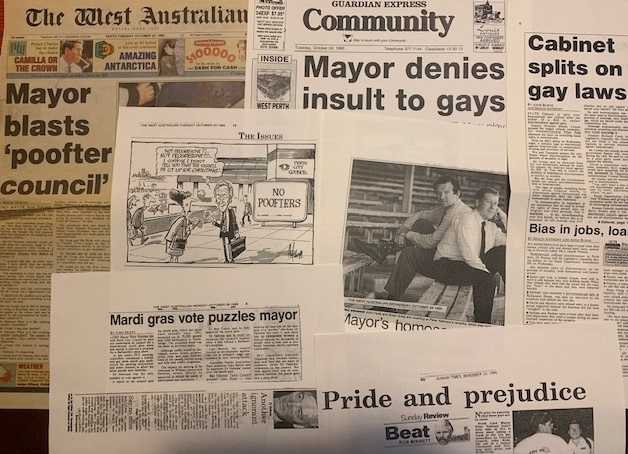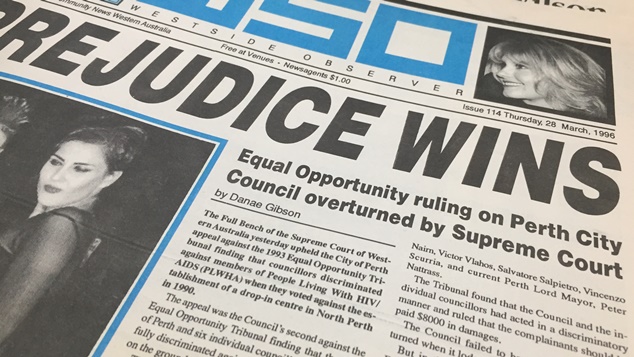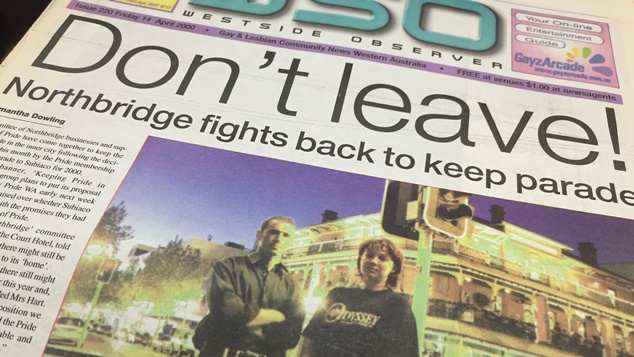
Recent events have reminded Perth’s LGBTQIA+ communities of the long road that has been travelled to see Perth’s PrideFEST grow to become one of the biggest events in the city. The intersection between Pride, The Perth City Council, and politics has often been a space of discord.
Back in the 1990s Brian Greig was at the centre of it all, here he looks back at the hard fought battle for LGBTQIA+ people to be recognised and respected by the City of Perth.
Twenty five years ago the Lord Mayor of Perth City Council, Dr Peter Nattrass, exploded into the media with an extraordinary outburst.
Over the next six years he would double-down, threatening to ban the Pride Parade which by 1999 had become the biggest LGBTI event in Australia, after the Sydney Gay and Lesbian Mardi Gras.
Western Australia was a very different place in 1995. The anti-gay laws in place were the worst anywhere in the western world outside of Romania. The age of consent was 21. There were no anti-discrimination protections and no legal recognition for same-sex couples. It was a criminal offence “to promote or encourage homosexual behaviour as part of the teaching in any primary or secondary educational institution,” and it was “contrary to public policy to encourage or promote homosexual behaviour and the encouragement or promotion of homosexual behaviour shall not be capable of being a public purpose.”
Importantly for context, the country was only just coming out of the peak of the AIDS epidemic and hostility towards gays was not uncommon. But change was coming and it unnerved conservatives.
In 1993, Richard Court’s Liberal Government broke up the old Perth City Council and created four new municipalities. This included a smaller City of Perth along with Town of Cambridge, Town of Victoria Park and Town of Vincent – which covered the ‘lavender belt’ of Northbridge, North Perth, Leederville and Mount Lawley.
At the inaugural election for Vincent in May 1995, three openly gay candidates ran: John Hyde, Justin Di Lollo and myself. I was elected along with John – and Justin only just missed out. And so the first openly gay people elected to public office in WA marked a milestone and created quite a media fuss. This would go ballistic when Vincent became the first Council in Australia to fly the rainbow flag during Pride Month.

Then on October 24th all hell broke loose. The week beforehand Dr Nattrass had been at a Greek Businessman’s Dinner attended by Federal Immigration Minister Nick Bolkus. Here he spotted Vincent CEO John Giorgi, approached him and asked loudly, “How are the poofters getting on? What’s it like working for poofter Councillors? The Council is run by poofters, they control Vincent, it’s disgusting.” Nattrass then turned his attention to the Pride Parade and asked: “Where is it going to stop!?”
When The West Australian newspaper chased Dr Nattrass for further comment he did not resile. “I certainly did ask how the poofters were getting on. I’m interested to know that you can have people that flaunt their homosexuality on Council and I can’t see anything wrong with asking how they’re getting on.”
Dr Nattrass said his conversation with Mr Giorgi was simply “light hearted dinner conversation,” a claim rejected by those present including Toula Myalanas from the North Perth Migrant Resource Center who told The West Australian “the comments were inappropriate and made guests feel uncomfortable.”
For Perth’s gay community, Dr Nattrass’ attempts to dismiss claims of homophobia rang hollow because he had form in this area. Three years earlier he and five fellow Peth City Councillors were found by the Equal Opportunity Tribunal to have discriminated against a support group for people living with AIDS by denying permission to establish a drop-in centre on Walcott Street.
Dr Nattrass led the charge against the centre with alarmist misinformation, including his claim that “AIDS infected tissues could blow over the fence.” It was regarded as improbable that a highly qualified gynaecologist could be that ignorant about HIV transmission.

In sweet irony, on the day that The West Australian splashed Dr Nattrass’ outburst on its front page he tried to go into hiding to avoid the media, but had to officiate a function in Forrest Chase to celebrate the International Day of Tolerance. He refused to front the scrum of journalists chasing him but instead ran down steps into an underground car-park flanked by security guards – and this image became the lead item on TV news that night.
The following day through a media statement, Dr Nattrass insisted his comments were not made with any animus. “I have a number of friends and acquaintances who are homosexual and for whom I have high regard, and I applaud the achievements of many homosexuals in the Arts and the professions… I disapprove of homosexuals who flaunt their sexual behaviour in a way that can have an unhealthy and damaging influence on young West Australians,” he said.
The whole issue brought welcome attention to the lack of sexuality anti-discrimination laws in WA and the push for reform. The WA Equal Opportunity Commission had released a discussion paper and advocated change. The final report and public submissions had been sitting with Attorney General Cheryl Edwardes for ten months as she “considered” them, but Premier Court all but ruled out any legislation.
In November 1995, Mrs Edwardes said the government had received 392 submissions with 92 percent supporting reform. On this basis the government would not change the law because “a significant minority of people were opposed to it.” Mrs Edwardes said that homosexuals who didn’t like the laws in WA could move interstate.
A second push to introduce anti-discrimination laws in 1996 split the Liberals and Nationals (Deputy Premier Hendy Cowan in favour), but new Attorney General Peter Foss was strongly opposed. “The right of people, including those with strong religious beliefs, to discriminate against homosexuals was more important than the right of homosexuals to equal treatment,” Mr Foss told The West Australian. The Private Member’s Bill was sunk.
Meanwhile, Dr Nattrass was upping-the-ante and targeted the route of the Pride Parade which started in Vincent but ended in Perth. His voting bloc on Council refused permission for street closures for the parade. It looked seriously like the parade would go ahead without a PCC permit and protesters would clash with police where Beaufort Street crosses Newcastle Street – the border between the two councils. Everyone was on edge, bracing for Perth’s Stonewall riot to erupt.
Wiser heads got to City Councillors and they backed down, but it wasn’t over. The following year Dr Nattrass was the only Perth City Councillor to oppose street closures for the parade which Council officers estimated now attracted 70,000 spectators and 3,500 participants. He said he could not reconcile Council’s support for the parade when last month it had opposed a peep-show stage at Barbarella’s sex shop.
Seemingly buoyed by the encouraging letters and calls he was getting from religious conservatives and anti-LGBTI groups, in 1999 Dr Nattrass went for broke.
Cultural staff at the City of Perth had budgeted $10,000 sponsorship towards the Pride Parade, but Dr Nattrass and his cronies knocked it back. The same refusal occurred again in 2000, with Dr Nattrass making a speech about how this shouldn’t be on Perth streets.
A Subiaco businessman then approached Pride President, Shaun Temby, and offered $10,000 to move the parade to Subiaco. Pride took this proposal to its membership at a Special General Meeting and it agreed to explore the option.
Temby and Pride co-chairs raised this proposal with City of Perth, but Dr Nattrass refused to meet with them, delegating Deputy Mayor Michael Sutherland. According to Temby, “We were annoyed that Mardi Gras received $250,000 each year in city sponsorship, but Perth was actually charging us for road closures.”
During this time Northbridge businesses, anxious to keep the festival, rallied and raised $67,000 for Pride. Jane Hart from the Court Hotel and Tim Brown from Connections led the charge. This included the use of the Fish Markets as a party venue. Sensing the community push-back, City of Perth councillors re-invited Pride to apply for sponsorship in the new financial year. It was approved.

But Dr Nattrass wasn’t done yet. In 2000, he used the local government postal elections to include a survey of City of Perth ratepayers on support for the Pride Parade. It became the first referendum in Australia on homosexuality, 17 years before the postal survey on equal marriage.
Meanwhile, applications for the parade to move to Subiaco struck the same homophobia at its Council meeting, with shrill complaints from the public. Pride was now running out of time, so it withdrew the Subiaco option and returned to Northbridge to the jubilation of its business community.
Pride went on to have a huge festival and parade, even winning Community Event of the Year in the City of Perth Australia Day awards 2001. As Lord Mayor, Dr Nattrass broke with tradition and refused to present the award personally.
This was also the year that law reform was initiated by the new Gallop Labor Government, and there was no doubt the high profile of this controversy and the public conversation it generated helped the cause.
By this stage I was a Senator in Federal Parliament and had a budget for mail-outs. During the Council survey on Pride, I wrote to all voters in Perth and asked them to vote YES. Dr Nattrass was outraged and tried to lodge a formal complaint against me for “misusing parliamentary resources.” However, he soon discovered that while federal MPs are not permitted to use parliamentary resources for election campaigns they are entitled to do so for referenda.
The whole episode backfired on Dr Nattrass. More than 56 percent of voters said YES, leaving the Lord Mayor nowhere to go. In May the following year, John Hyde – who had now been Mayor of Vincent for the previous three years, became the MP for the state seat of Perth, and the first openly gay MP in WA’s lower house.
The birth of a gay federal senator and gay state MP from the Town (now City) of Vincent was greatly enabled by gynaecologist, Dr Nattrass. Together, the pro-LGBTI forces clashed with the anti forces, generating statewide debate, intense media scrutiny and momentum for law reform.
This was accompanied by a determined Pride Committee, articulate lobby group and influential LGBTI newspaper Westside Observer, the forerunner to OUTinPerth.
By late 2001, the state Labor Government with Greens Upper House had equalised the age of consent, abolished the anti-gay laws, introduced anti-discrimination protections, recognised same-sex couples as de facto, and made adoption, IVF and the Family Court accessible to us.
Dr Nattrass’ homophobia fell silent after this and he retired 2007. His successor, Lisa Scaffidi, was a great supporter of Pride. Ten years later in 2017, former Mayor of Vincent, John Carey, became the second openly gay MP for Perth.
It’s important for our community to understand this history, not just to see how much things have changed but also to see that change is possible, even against fierce resistance. By telling our stories and showing our humanity, we can win the support of ordinary voters, shift public opinion and change the law. This is as true today as it was a quarter of a century ago.
Brian Greig OAM was a Town of Vincent Councillor from 1995 – 1999. He was elected to the Australian Senate in 1999, serving six years.
Do you need some support?
If you are struggling with anxiety or depression, support and counselling are available from:
Lifeline: 13 11 14 or lifeline.org.au
Beyondblue: 1300 22 4636 and www.beyondblue.org.au
QLife: 1800 184 527 and www.qlife.org.au
QLife are a counselling and referral service for Lesbian, Gay, Bisexual, Transgender and Intersex (LGBTI+) people.

Love OUTinPerth Campaign
Help support the publication of OUTinPerth by contributing to our
GoFundMe campaign.





